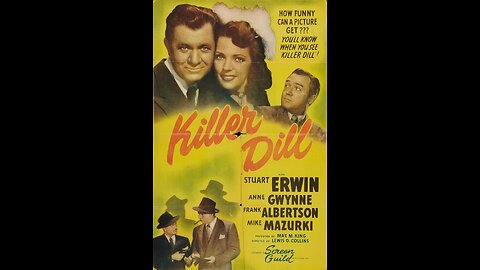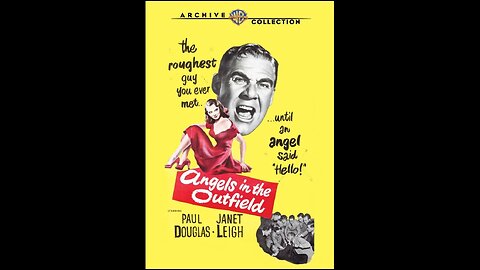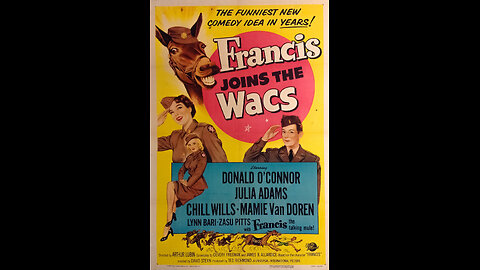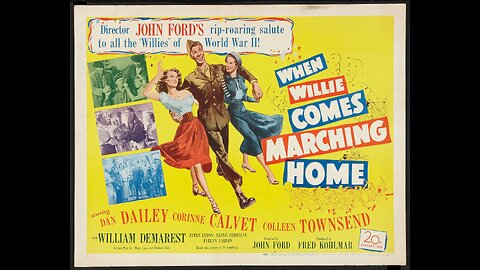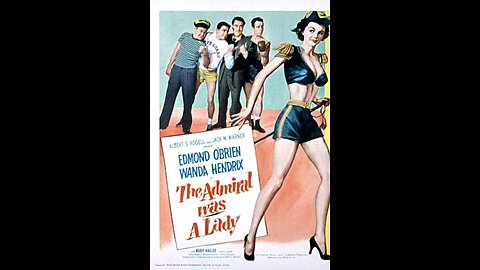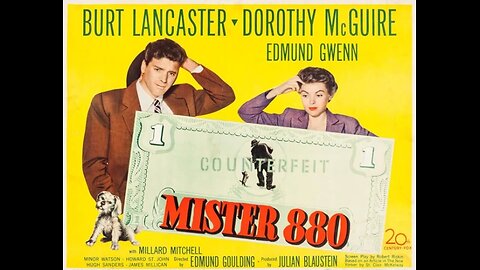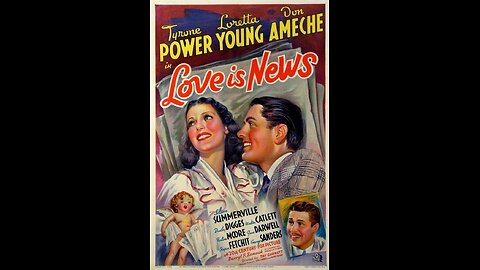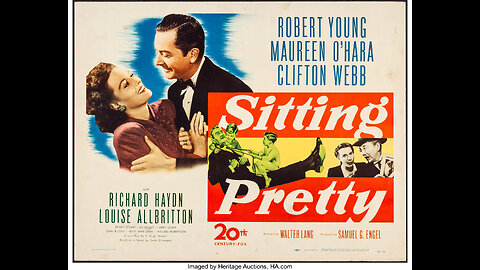
Comedy Classics
147 videos
Updated 3 days ago
The Best Comedy Movies from the Classic Era
-
Leave It to the Marines (1951) | Directed by Sam Newfield
 Classic Films & Movies Archive"Leave It to the Marines" is a lighthearted military comedy about a fast-talking civilian who mistakenly ends up enlisting in the U.S. Marine Corps and finds himself embroiled in a series of misadventures. Through his clumsy antics and accidental heroics, he stumbles through boot camp, military protocol, and eventually manages to make a mark in his own unique way. Genre: Comedy Director: Sam Newfield Sam Newfield was an extraordinarily prolific American film director, known for directing over 250 films, primarily B-movies, during a career spanning the 1930s through the 1950s. He worked extensively with Producers Releasing Corporation and was known for his efficiency and speed in churning out low-budget features across genres, especially westerns, crime dramas, and comedies. Star Cast: - Sid Melton as Gerald Meek - Mara Lynn as Myrna - Gregg Martell as Sgt. Galloway - Paul Hogan as Lt. Mack - Wilfred Lucas as Col. Bliss - Donald Kerr as Hotel Clerk "Leave It to the Marines" was not a major box office draw and received modest attention during its release. Critics viewed it as a formulaic but amiable service comedy, primarily appealing to fans of slapstick humor and military gags. While not critically acclaimed, it found an audience among viewers looking for light entertainment and wartime-era comedy. Fun Facts: - The film was produced by Lippert Pictures, known for their low-budget productions throughout the 1940s and 1950s. - Sid Melton, the star of the film, was a popular character actor who later became well-known for his comedic roles on television, particularly in shows like "Green Acres" and "The Danny Thomas Show." - The movie reflects post-WWII America's continued interest in military comedies, which were a staple of 1950s cinema. * This Rumble Movie Channel is comprehensively indexed on https://kinoquick.com - find you favourite movies fast & free! * Follow this channel to be notified of daily movie updates.206 views
Classic Films & Movies Archive"Leave It to the Marines" is a lighthearted military comedy about a fast-talking civilian who mistakenly ends up enlisting in the U.S. Marine Corps and finds himself embroiled in a series of misadventures. Through his clumsy antics and accidental heroics, he stumbles through boot camp, military protocol, and eventually manages to make a mark in his own unique way. Genre: Comedy Director: Sam Newfield Sam Newfield was an extraordinarily prolific American film director, known for directing over 250 films, primarily B-movies, during a career spanning the 1930s through the 1950s. He worked extensively with Producers Releasing Corporation and was known for his efficiency and speed in churning out low-budget features across genres, especially westerns, crime dramas, and comedies. Star Cast: - Sid Melton as Gerald Meek - Mara Lynn as Myrna - Gregg Martell as Sgt. Galloway - Paul Hogan as Lt. Mack - Wilfred Lucas as Col. Bliss - Donald Kerr as Hotel Clerk "Leave It to the Marines" was not a major box office draw and received modest attention during its release. Critics viewed it as a formulaic but amiable service comedy, primarily appealing to fans of slapstick humor and military gags. While not critically acclaimed, it found an audience among viewers looking for light entertainment and wartime-era comedy. Fun Facts: - The film was produced by Lippert Pictures, known for their low-budget productions throughout the 1940s and 1950s. - Sid Melton, the star of the film, was a popular character actor who later became well-known for his comedic roles on television, particularly in shows like "Green Acres" and "The Danny Thomas Show." - The movie reflects post-WWII America's continued interest in military comedies, which were a staple of 1950s cinema. * This Rumble Movie Channel is comprehensively indexed on https://kinoquick.com - find you favourite movies fast & free! * Follow this channel to be notified of daily movie updates.206 views -
Killer Dill (1947) | Directed by Lewis D. Collins
 Classic Films & Movies ArchiveKiller Dill is a crime comedy set in the Prohibition era, where a mild-mannered lingerie salesman named Johnny Dill accidentally gains a reputation as a notorious gangster. When Johnny tries to impress his love interest by acting tough, a series of misunderstandings and coincidences lead everyone to believe he’s a ruthless mobster. Things spiral out of control as rival gangsters, the press, and law enforcement get involved, and Johnny must find a way to clear his name and return to his ordinary life. Genre: Comedy, Crime Director: Lewis D. Collins Lewis D. Collins was an American director best known for his work in serials and B-movies during the 1930s and 1940s. His career was defined by fast-paced storytelling and workmanlike efficiency, often directing action, adventure, and crime films. Though not a major name in Hollywood, Collins had a solid reputation for delivering entertaining low-budget pictures and was a reliable figure in Republic and Universal studios' rosters. Star Cast: - Stuart Erwin as Johnny Dill - Anne Gwynne as Judy Parker - Frank Albertson as William T. Allen - Milburn Stone as Big Nick Moronie - Eduard Franz as Maboose - Dorothy Granger as Mabel - Mike Mazurki as Louie Killer Dill was received as a lighthearted and amusing comedy, offering postwar audiences a satirical take on gangster films. Stuart Erwin’s performance as the hapless hero won praise for its comic timing, and the film’s playful take on 1920s crime tropes provided good-natured entertainment. Though not a major release, it developed a modest following among fans of vintage crime comedies. Fun Facts: - The film's title is a pun on the name “John Dillinger,” the infamous real-life gangster of the 1930s. - Stuart Erwin, best known for playing bumbling everyman roles, leaned into his typecasting for the role of Johnny Dill with charming effect. - The movie blends gangster clichés with slapstick humor, spoofing both the crime genre and male bravado. - Anne Gwynne, who plays the romantic lead, was a popular pin-up girl during World War II and frequently appeared in Universal horror and mystery films. - The film is sometimes categorized as a screwball comedy due to its rapid-fire dialogue and mistaken identity plot. Killer Dill (1947) is a charming and tongue-in-cheek send-up of gangster melodramas, offering audiences a comical twist on the tough-guy archetype with a story that combines romance, mistaken identity, and a touch of slapstick flair. * This Rumble Movie Channel is comprehensively indexed on https://kinoquick.com - find you favourite movies fast & free! * Follow this channel to be notified of daily movie updates.209 views
Classic Films & Movies ArchiveKiller Dill is a crime comedy set in the Prohibition era, where a mild-mannered lingerie salesman named Johnny Dill accidentally gains a reputation as a notorious gangster. When Johnny tries to impress his love interest by acting tough, a series of misunderstandings and coincidences lead everyone to believe he’s a ruthless mobster. Things spiral out of control as rival gangsters, the press, and law enforcement get involved, and Johnny must find a way to clear his name and return to his ordinary life. Genre: Comedy, Crime Director: Lewis D. Collins Lewis D. Collins was an American director best known for his work in serials and B-movies during the 1930s and 1940s. His career was defined by fast-paced storytelling and workmanlike efficiency, often directing action, adventure, and crime films. Though not a major name in Hollywood, Collins had a solid reputation for delivering entertaining low-budget pictures and was a reliable figure in Republic and Universal studios' rosters. Star Cast: - Stuart Erwin as Johnny Dill - Anne Gwynne as Judy Parker - Frank Albertson as William T. Allen - Milburn Stone as Big Nick Moronie - Eduard Franz as Maboose - Dorothy Granger as Mabel - Mike Mazurki as Louie Killer Dill was received as a lighthearted and amusing comedy, offering postwar audiences a satirical take on gangster films. Stuart Erwin’s performance as the hapless hero won praise for its comic timing, and the film’s playful take on 1920s crime tropes provided good-natured entertainment. Though not a major release, it developed a modest following among fans of vintage crime comedies. Fun Facts: - The film's title is a pun on the name “John Dillinger,” the infamous real-life gangster of the 1930s. - Stuart Erwin, best known for playing bumbling everyman roles, leaned into his typecasting for the role of Johnny Dill with charming effect. - The movie blends gangster clichés with slapstick humor, spoofing both the crime genre and male bravado. - Anne Gwynne, who plays the romantic lead, was a popular pin-up girl during World War II and frequently appeared in Universal horror and mystery films. - The film is sometimes categorized as a screwball comedy due to its rapid-fire dialogue and mistaken identity plot. Killer Dill (1947) is a charming and tongue-in-cheek send-up of gangster melodramas, offering audiences a comical twist on the tough-guy archetype with a story that combines romance, mistaken identity, and a touch of slapstick flair. * This Rumble Movie Channel is comprehensively indexed on https://kinoquick.com - find you favourite movies fast & free! * Follow this channel to be notified of daily movie updates.209 views -
Angels in the Outfield (1951) | Directed by Clarence Brown
 Classic Films & Movies ArchiveAngels in the Outfield is a heartwarming fantasy sports comedy about a struggling baseball team and divine intervention. The story follows the Pittsburgh Pirates, a team in last place, led by their gruff and bad-tempered manager, Guffy McGovern. After a young orphan prays for the team to start winning, celestial forces intervene, and a group of angels begins helping the players. As McGovern undergoes a personal transformation, the team’s fortunes turn around, leading to a miraculous season filled with hope, faith, and second chances. Genre: Fantasy, Comedy, Sports Director: Clarence Brown Clarence Brown was an American film director known for his elegant storytelling and ability to craft both dramatic and lighthearted films. Born in 1890, he directed several acclaimed movies, including National Velvet, The Yearling, and many collaborations with Greta Garbo. With a career spanning the silent era to the 1950s, Brown was highly respected in Hollywood for his versatility and craftsmanship. Star Cast: - Paul Douglas as Guffy McGovern - Janet Leigh as Jennifer Paige - Keenan Wynn as Fred Bayles - Donna Corcoran as Bridget White - Spring Byington as Sister Edwina - Bruce Bennett as Saul Hellman Upon its release, Angels in the Outfield was well received for its charming blend of sports, comedy, and fantasy. Audiences appreciated the film’s uplifting message and lighthearted approach to baseball. Paul Douglas’s performance as the gruff manager with a softening heart was widely praised, and the film became a family favorite. Over the years, it has remained a beloved classic, particularly among baseball fans and those who enjoy nostalgic sports movies. Fun Facts: - The film was shot at Forbes Field, the real home stadium of the Pittsburgh Pirates at the time, adding authenticity to the baseball scenes. - A real-life Pittsburgh Pirates radio announcer, Joe E. Brown, makes a cameo in the film, further grounding it in the world of professional baseball. - The movie was remade in 1994 with a modernized story featuring the California Angels instead of the Pittsburgh Pirates. - The celestial voices of the angels in the film are never actually seen on screen, leaving their presence to the audience’s imagination. - Paul Douglas, who played the irritable coach, was a huge baseball fan in real life and had a deep appreciation for the sport. * This Rumble Movie Channel is comprehensively indexed on https://kinoquick.com - find you favourite movies fast & free! Subscribe to this channel to be notified of daily movie updates.300 views
Classic Films & Movies ArchiveAngels in the Outfield is a heartwarming fantasy sports comedy about a struggling baseball team and divine intervention. The story follows the Pittsburgh Pirates, a team in last place, led by their gruff and bad-tempered manager, Guffy McGovern. After a young orphan prays for the team to start winning, celestial forces intervene, and a group of angels begins helping the players. As McGovern undergoes a personal transformation, the team’s fortunes turn around, leading to a miraculous season filled with hope, faith, and second chances. Genre: Fantasy, Comedy, Sports Director: Clarence Brown Clarence Brown was an American film director known for his elegant storytelling and ability to craft both dramatic and lighthearted films. Born in 1890, he directed several acclaimed movies, including National Velvet, The Yearling, and many collaborations with Greta Garbo. With a career spanning the silent era to the 1950s, Brown was highly respected in Hollywood for his versatility and craftsmanship. Star Cast: - Paul Douglas as Guffy McGovern - Janet Leigh as Jennifer Paige - Keenan Wynn as Fred Bayles - Donna Corcoran as Bridget White - Spring Byington as Sister Edwina - Bruce Bennett as Saul Hellman Upon its release, Angels in the Outfield was well received for its charming blend of sports, comedy, and fantasy. Audiences appreciated the film’s uplifting message and lighthearted approach to baseball. Paul Douglas’s performance as the gruff manager with a softening heart was widely praised, and the film became a family favorite. Over the years, it has remained a beloved classic, particularly among baseball fans and those who enjoy nostalgic sports movies. Fun Facts: - The film was shot at Forbes Field, the real home stadium of the Pittsburgh Pirates at the time, adding authenticity to the baseball scenes. - A real-life Pittsburgh Pirates radio announcer, Joe E. Brown, makes a cameo in the film, further grounding it in the world of professional baseball. - The movie was remade in 1994 with a modernized story featuring the California Angels instead of the Pittsburgh Pirates. - The celestial voices of the angels in the film are never actually seen on screen, leaving their presence to the audience’s imagination. - Paul Douglas, who played the irritable coach, was a huge baseball fan in real life and had a deep appreciation for the sport. * This Rumble Movie Channel is comprehensively indexed on https://kinoquick.com - find you favourite movies fast & free! Subscribe to this channel to be notified of daily movie updates.300 views -
Francis Joins the WACS (1954) | Directed by Arthur Lubin
 Classic Films & Movies Archive"Francis Joins the WACS" is a 1954 American black-and-white comedy film directed by Arthur Lubin. This fifth installment in the "Francis the Talking Mule" series follows the misadventures of Peter Stirling, a junior officer mistakenly assigned to the Women's Army Corps (WAC) due to a clerical error. With the help of his talking mule, Francis, Peter navigates the challenges of his unusual posting, leading to a series of comedic situations. Genre: Comedy / Fantasy Director: Arthur Lubin Arthur Lubin (1898–1995) was an American film director and producer known for his work in comedy and fantasy genres. He gained prominence directing several Abbott and Costello films and is recognized for helming the "Francis the Talking Mule" series. Lubin's adeptness at blending humor with whimsical elements contributed to his successful career in Hollywood. Star Cast: - Donald O'Connor as Peter Stirling - Julie Adams as Captain Jane Parker - Mamie Van Doren as Corporal Bunky Hilstrom - Chill Wills as General Benjamin Kaye / voice of Francis - Lynn Bari as Major Louise Simpson - ZaSu Pitts as Lieutenant Valerie Humpert Upon its release, "Francis Joins the WACS" was well-received, continuing the success of the "Francis" series. Variety noted that the film maintained the "screwball comedy" characteristic of its predecessors, presenting it "slickly" to audiences. The film's box office performance surpassed that of the second, third, and fourth entries in the series, indicating sustained audience interest. Fun Facts: 1. Chill Wills, who provided the distinctive voice of Francis, also appeared on-screen as General Benjamin Kaye, marking a unique dual role in the film. 2. The film was based on the story "Mr. WAC" by Herbert Baker, contributing to its comedic exploration of gender roles within the military context. 3. Filming commenced in February 1954, with production taking place at locations including Van Nuys, Los Angeles, and San Diego, California. 4. This installment was Donald O'Connor's penultimate appearance as Peter Stirling in the "Francis" series, with "Francis in the Navy" (1955) marking his final portrayal of the character. 5. The film was released on July 30, 1954, and has since been made available on various home media formats, including a complete collection of the "Francis the Talking Mule" series. * This Rumble Movie Channel is comprehensively indexed on https://kinoquick.com - find you favourite movies fast & free! * Follow this channel to be notified of daily movie updates.294 views
Classic Films & Movies Archive"Francis Joins the WACS" is a 1954 American black-and-white comedy film directed by Arthur Lubin. This fifth installment in the "Francis the Talking Mule" series follows the misadventures of Peter Stirling, a junior officer mistakenly assigned to the Women's Army Corps (WAC) due to a clerical error. With the help of his talking mule, Francis, Peter navigates the challenges of his unusual posting, leading to a series of comedic situations. Genre: Comedy / Fantasy Director: Arthur Lubin Arthur Lubin (1898–1995) was an American film director and producer known for his work in comedy and fantasy genres. He gained prominence directing several Abbott and Costello films and is recognized for helming the "Francis the Talking Mule" series. Lubin's adeptness at blending humor with whimsical elements contributed to his successful career in Hollywood. Star Cast: - Donald O'Connor as Peter Stirling - Julie Adams as Captain Jane Parker - Mamie Van Doren as Corporal Bunky Hilstrom - Chill Wills as General Benjamin Kaye / voice of Francis - Lynn Bari as Major Louise Simpson - ZaSu Pitts as Lieutenant Valerie Humpert Upon its release, "Francis Joins the WACS" was well-received, continuing the success of the "Francis" series. Variety noted that the film maintained the "screwball comedy" characteristic of its predecessors, presenting it "slickly" to audiences. The film's box office performance surpassed that of the second, third, and fourth entries in the series, indicating sustained audience interest. Fun Facts: 1. Chill Wills, who provided the distinctive voice of Francis, also appeared on-screen as General Benjamin Kaye, marking a unique dual role in the film. 2. The film was based on the story "Mr. WAC" by Herbert Baker, contributing to its comedic exploration of gender roles within the military context. 3. Filming commenced in February 1954, with production taking place at locations including Van Nuys, Los Angeles, and San Diego, California. 4. This installment was Donald O'Connor's penultimate appearance as Peter Stirling in the "Francis" series, with "Francis in the Navy" (1955) marking his final portrayal of the character. 5. The film was released on July 30, 1954, and has since been made available on various home media formats, including a complete collection of the "Francis the Talking Mule" series. * This Rumble Movie Channel is comprehensively indexed on https://kinoquick.com - find you favourite movies fast & free! * Follow this channel to be notified of daily movie updates.294 views -
When Willie Comes Marching Home (1950) | Directed by the legendary John Ford
 Classic Films & Movies ArchiveDirector: John Ford Stars: Dan Dailey, Corinne Calvet, Colleen Townsend, William Demarest "When Willie Comes Marching Home" (1950) is a heartwarming and comedic tribute to the post-World War II era, directed by the legendary John Ford. The film stars Dan Dailey as Willie Kluggs, a small-town American soldier who becomes an unlikely hero and experiences the trials and tribulations of returning to civilian life. Set in the picturesque town of Parkview, USA, the film follows Willie Kluggs as he returns home after serving in the Pacific during World War II. Expecting a hero's welcome, Willie is surprised to find that the townsfolk are more interested in the local war hero, Joe Rogers (William Demarest). Unfazed, Willie sets out to win the heart of his longtime crush, Althea (Corinne Calvet), and to navigate the challenges of adjusting to civilian life. Dan Dailey delivers a charismatic and endearing performance as Willie, capturing the essence of a soldier grappling with the complexities of readjusting to everyday life. The film humorously explores Willie's attempts to fit back into his pre-war routine, including dealing with a meddling family, coping with newfound celebrity status, and navigating the intricacies of romance. The supporting cast, including Colleen Townsend as Margaret, adds charm to the film, creating a delightful ensemble that contributes to the overall nostalgic atmosphere. William Demarest's portrayal of the local hero and Willie's friend provides both comedic and poignant moments, adding depth to the narrative. John Ford's direction brings a blend of humor and sentimentality to the film, highlighting the challenges faced by returning veterans while celebrating the resilience of the human spirit. The screenplay, written by Sy Gomberg, skillfully balances comedy, romance, and drama, creating a narrative that resonates with audiences. As Willie's journey unfolds, "When Willie Comes Marching Home" explores themes of love, sacrifice, and the impact of war on individuals and communities. The film's warmth, wit, and genuine performances make it a timeless piece of post-war cinema, offering a lighthearted yet meaningful look at the experiences of those who served and returned to the home front. With its engaging characters, memorable performances, and the masterful touch of John Ford, "When Willie Comes Marching Home" stands as a delightful and enduring portrayal of the challenges and joys faced by returning veterans in the aftermath of World War II.161 views
Classic Films & Movies ArchiveDirector: John Ford Stars: Dan Dailey, Corinne Calvet, Colleen Townsend, William Demarest "When Willie Comes Marching Home" (1950) is a heartwarming and comedic tribute to the post-World War II era, directed by the legendary John Ford. The film stars Dan Dailey as Willie Kluggs, a small-town American soldier who becomes an unlikely hero and experiences the trials and tribulations of returning to civilian life. Set in the picturesque town of Parkview, USA, the film follows Willie Kluggs as he returns home after serving in the Pacific during World War II. Expecting a hero's welcome, Willie is surprised to find that the townsfolk are more interested in the local war hero, Joe Rogers (William Demarest). Unfazed, Willie sets out to win the heart of his longtime crush, Althea (Corinne Calvet), and to navigate the challenges of adjusting to civilian life. Dan Dailey delivers a charismatic and endearing performance as Willie, capturing the essence of a soldier grappling with the complexities of readjusting to everyday life. The film humorously explores Willie's attempts to fit back into his pre-war routine, including dealing with a meddling family, coping with newfound celebrity status, and navigating the intricacies of romance. The supporting cast, including Colleen Townsend as Margaret, adds charm to the film, creating a delightful ensemble that contributes to the overall nostalgic atmosphere. William Demarest's portrayal of the local hero and Willie's friend provides both comedic and poignant moments, adding depth to the narrative. John Ford's direction brings a blend of humor and sentimentality to the film, highlighting the challenges faced by returning veterans while celebrating the resilience of the human spirit. The screenplay, written by Sy Gomberg, skillfully balances comedy, romance, and drama, creating a narrative that resonates with audiences. As Willie's journey unfolds, "When Willie Comes Marching Home" explores themes of love, sacrifice, and the impact of war on individuals and communities. The film's warmth, wit, and genuine performances make it a timeless piece of post-war cinema, offering a lighthearted yet meaningful look at the experiences of those who served and returned to the home front. With its engaging characters, memorable performances, and the masterful touch of John Ford, "When Willie Comes Marching Home" stands as a delightful and enduring portrayal of the challenges and joys faced by returning veterans in the aftermath of World War II.161 views -
The Admiral Was a Lady (1950) | Directed by Albert S. Rogell
 Classic Films & Movies ArchiveCast: Edmond O'Brien, Wanda Hendrix, Rudy Vallee, Johnny Sands "The Admiral Was a Lady" is a charming romantic comedy that unfolds against the backdrop of post-World War II San Francisco. Steve, played by Edmond O'Brien, is a discharged Navy veteran struggling to find employment. In a twist of fate, he stumbles upon a vacant luxury apartment and decides to pose as its absent owner, the wealthy Admiral W. R. O'Brian. Alongside him is Susie, played by Wanda Hendrix, a former military nurse who joins in on the masquerade. The film takes delightful turns as the pair navigates the challenges of maintaining their fabricated identities, encountering unexpected visitors and sparking a budding romance in the process. As the charade unfolds, comedic situations ensue, blending elements of mistaken identity, humor, and romance. Rudy Vallee and Johnny Sands contribute to the film's entertaining ensemble cast. "The Admiral Was a Lady" captures the spirit of the post-war era, delivering a lighthearted and entertaining story that explores themes of love, identity, and the humorous consequences of pretending to be someone you're not.73 views
Classic Films & Movies ArchiveCast: Edmond O'Brien, Wanda Hendrix, Rudy Vallee, Johnny Sands "The Admiral Was a Lady" is a charming romantic comedy that unfolds against the backdrop of post-World War II San Francisco. Steve, played by Edmond O'Brien, is a discharged Navy veteran struggling to find employment. In a twist of fate, he stumbles upon a vacant luxury apartment and decides to pose as its absent owner, the wealthy Admiral W. R. O'Brian. Alongside him is Susie, played by Wanda Hendrix, a former military nurse who joins in on the masquerade. The film takes delightful turns as the pair navigates the challenges of maintaining their fabricated identities, encountering unexpected visitors and sparking a budding romance in the process. As the charade unfolds, comedic situations ensue, blending elements of mistaken identity, humor, and romance. Rudy Vallee and Johnny Sands contribute to the film's entertaining ensemble cast. "The Admiral Was a Lady" captures the spirit of the post-war era, delivering a lighthearted and entertaining story that explores themes of love, identity, and the humorous consequences of pretending to be someone you're not.73 views -
Mister 880 (1950) | A charming comedy-drama directed by Edmund Goulding
 Classic Films & Movies Archive"Mister 880" is a charming comedy-drama directed by Edmund Goulding and released in 1950. The film is based on a true story and features a standout performance by Burt Lancaster. The title refers to the alias used by an elderly counterfeiter, whose small-scale operations evade the authorities for years. The movie explores themes of justice, kindness, and the peculiarities of human nature. The plot revolves around the character of "Mister 880," played by Edmund Gwenn. This endearing old man, whose real name is Emerich Juettner, earns a modest living by counterfeiting one-dollar bills. His counterfeits are of such low quality that they often go undetected in circulation. The local authorities, led by Treasury Agent Steve Buchanan (Burt Lancaster), become aware of the fake bills and launch an investigation to apprehend the elusive counterfeiter. As Agent Buchanan delves into the case, he discovers that Mister 880 is not motivated by greed but rather by a desire to make ends meet and live a simple life. This realization leads Buchanan to question the severity of the charges against Mister 880 and to reconsider the true nature of justice. The film is characterized by its light-hearted tone, blending elements of comedy and drama. It highlights the human side of law enforcement and challenges preconceived notions about criminals. The relationship between Buchanan and Mister 880 adds depth to the narrative, as Buchanan grapples with the moral dilemma of bringing to justice a man who has inadvertently become a local folk hero. Edmund Gwenn's portrayal of Mister 880 is heartwarming and endearing, capturing the innocence and sincerity of a man driven by humble motivations. Burt Lancaster brings a blend of wit and compassion to his role as Agent Buchanan, adding a layer of humanity to the character. The film's screenplay, written by Robert Riskin, skillfully balances humor and sentimentality. It draws inspiration from the real-life case of Emerich Juettner, the amateur counterfeiter on whom the story is based. While "Mister 880" may not be as well-known as other films of its era, its unique premise, engaging characters, and exploration of themes such as justice and compassion contribute to its enduring appeal. The movie is a delightful blend of comedy and drama, offering a refreshing perspective on the pursuit of justice and the complexities of human behavior.97 views
Classic Films & Movies Archive"Mister 880" is a charming comedy-drama directed by Edmund Goulding and released in 1950. The film is based on a true story and features a standout performance by Burt Lancaster. The title refers to the alias used by an elderly counterfeiter, whose small-scale operations evade the authorities for years. The movie explores themes of justice, kindness, and the peculiarities of human nature. The plot revolves around the character of "Mister 880," played by Edmund Gwenn. This endearing old man, whose real name is Emerich Juettner, earns a modest living by counterfeiting one-dollar bills. His counterfeits are of such low quality that they often go undetected in circulation. The local authorities, led by Treasury Agent Steve Buchanan (Burt Lancaster), become aware of the fake bills and launch an investigation to apprehend the elusive counterfeiter. As Agent Buchanan delves into the case, he discovers that Mister 880 is not motivated by greed but rather by a desire to make ends meet and live a simple life. This realization leads Buchanan to question the severity of the charges against Mister 880 and to reconsider the true nature of justice. The film is characterized by its light-hearted tone, blending elements of comedy and drama. It highlights the human side of law enforcement and challenges preconceived notions about criminals. The relationship between Buchanan and Mister 880 adds depth to the narrative, as Buchanan grapples with the moral dilemma of bringing to justice a man who has inadvertently become a local folk hero. Edmund Gwenn's portrayal of Mister 880 is heartwarming and endearing, capturing the innocence and sincerity of a man driven by humble motivations. Burt Lancaster brings a blend of wit and compassion to his role as Agent Buchanan, adding a layer of humanity to the character. The film's screenplay, written by Robert Riskin, skillfully balances humor and sentimentality. It draws inspiration from the real-life case of Emerich Juettner, the amateur counterfeiter on whom the story is based. While "Mister 880" may not be as well-known as other films of its era, its unique premise, engaging characters, and exploration of themes such as justice and compassion contribute to its enduring appeal. The movie is a delightful blend of comedy and drama, offering a refreshing perspective on the pursuit of justice and the complexities of human behavior.97 views -
Love is News (1937) | romantic comedy film directed by Tay Garnett
 Classic Films & Movies Archive"Love is News" is a romantic comedy film released in 1937, directed by Tay Garnett. The movie stars Tyrone Power and Loretta Young in the lead roles, with Don Ameche, Slim Summerville, and George Sanders in supporting roles. The film is a classic screwball comedy that was popular during the 1930s and 1940s. The story revolves around a charismatic newspaper reporter, Steve Leyton (Tyrone Power), who is known for his knack for sensationalism and his talent for getting exclusive stories. His latest target is Tony Gateson (Don Ameche), a wealthy socialite engaged to the beautiful and wealthy heiress, Kay Hitchens (Loretta Young). Steve concocts a fake news story claiming that Tony is actually married to a mysterious woman, and chaos ensues as the fabricated tale spins out of control. As the fake news spreads like wildfire, Tony's engagement with Kay is jeopardized, and the characters find themselves in a series of comedic misunderstandings and misadventures. The film explores themes of media manipulation, the power of the press, and the consequences of sensationalism. "Love is News" is a delightful and entertaining screwball comedy that exemplifies the charm and wit characteristic of films from the Golden Age of Hollywood. The film benefits greatly from the chemistry between Tyrone Power and Loretta Young, whose performances elevate the material. Power's portrayal of the suave and mischievous reporter is charismatic, and Young brings a blend of sophistication and vulnerability to her role as the socialite caught in the middle of the chaos. The screenplay, written by Harry Tugend and Jack Yellen, is fast-paced and filled with clever dialogue. The film's humor is rooted in the absurdity of the situations and the rapid-fire banter between the characters. The screwball comedy genre often involves mistaken identities, zany antics, and romantic entanglements, and "Love is News" delivers on these elements with style. Director Tay Garnett skillfully navigates the comedic chaos, keeping the pace brisk and the energy high throughout the film. The visual style is typical of the era, with glamorous set designs and elegant costumes that contribute to the overall charm of the production. While "Love is News" may not be as well-known as some other classics from the same period, it remains a hidden gem for fans of screwball comedies. Its lighthearted tone, witty dialogue, and the charismatic performances of the lead actors make it a worthwhile watch for those interested in the romantic comedies of the 1930s. Overall, "Love is News" stands as a testament to the enduring appeal of classic Hollywood cinema and its ability to provide timeless entertainment.230 views
Classic Films & Movies Archive"Love is News" is a romantic comedy film released in 1937, directed by Tay Garnett. The movie stars Tyrone Power and Loretta Young in the lead roles, with Don Ameche, Slim Summerville, and George Sanders in supporting roles. The film is a classic screwball comedy that was popular during the 1930s and 1940s. The story revolves around a charismatic newspaper reporter, Steve Leyton (Tyrone Power), who is known for his knack for sensationalism and his talent for getting exclusive stories. His latest target is Tony Gateson (Don Ameche), a wealthy socialite engaged to the beautiful and wealthy heiress, Kay Hitchens (Loretta Young). Steve concocts a fake news story claiming that Tony is actually married to a mysterious woman, and chaos ensues as the fabricated tale spins out of control. As the fake news spreads like wildfire, Tony's engagement with Kay is jeopardized, and the characters find themselves in a series of comedic misunderstandings and misadventures. The film explores themes of media manipulation, the power of the press, and the consequences of sensationalism. "Love is News" is a delightful and entertaining screwball comedy that exemplifies the charm and wit characteristic of films from the Golden Age of Hollywood. The film benefits greatly from the chemistry between Tyrone Power and Loretta Young, whose performances elevate the material. Power's portrayal of the suave and mischievous reporter is charismatic, and Young brings a blend of sophistication and vulnerability to her role as the socialite caught in the middle of the chaos. The screenplay, written by Harry Tugend and Jack Yellen, is fast-paced and filled with clever dialogue. The film's humor is rooted in the absurdity of the situations and the rapid-fire banter between the characters. The screwball comedy genre often involves mistaken identities, zany antics, and romantic entanglements, and "Love is News" delivers on these elements with style. Director Tay Garnett skillfully navigates the comedic chaos, keeping the pace brisk and the energy high throughout the film. The visual style is typical of the era, with glamorous set designs and elegant costumes that contribute to the overall charm of the production. While "Love is News" may not be as well-known as some other classics from the same period, it remains a hidden gem for fans of screwball comedies. Its lighthearted tone, witty dialogue, and the charismatic performances of the lead actors make it a worthwhile watch for those interested in the romantic comedies of the 1930s. Overall, "Love is News" stands as a testament to the enduring appeal of classic Hollywood cinema and its ability to provide timeless entertainment.230 views -
Sitting Pretty (1948) | American comedy film directed by Walter Lang
 Classic Films & Movies Archive"Sitting Pretty" is a 1948 American comedy film directed by Walter Lang. The film stars Clifton Webb, Maureen O'Hara, and Robert Young in lead roles. The story revolves around a peculiar and sophisticated houseguest who creates chaos in the lives of a suburban family. Plot Summary: Harry King (Clifton Webb), an eccentric and erudite man, responds to an advertisement seeking a babysitter for a couple's three children. The couple, Tacey (Maureen O'Hara) and Grant Trimble (Robert Young), are initially skeptical but decide to hire Harry due to his articulate and convincing manner. However, they soon discover that Harry is not a typical babysitter. He is more of a houseguest who brings a unique, refined, and unconventional perspective to their lives. Harry's presence in the Trimble household causes a series of comedic situations as he provides unorthodox advice, challenges societal norms, and turns the family dynamics upside down. While some family members appreciate his influence, others are skeptical and concerned about the impact he might have on their lives. As Harry becomes more ingrained in the family's daily affairs, he reveals a surprising depth of character and wisdom that forces the Trimble family to reassess their values and priorities. The film explores themes of societal expectations, individuality, and the importance of unconventional thinking. Review: "Sitting Pretty" is a witty and charming comedy that benefits greatly from Clifton Webb's standout performance as the eccentric and intellectually superior Harry King. Webb's portrayal adds a sophisticated touch to the character, making him both humorous and endearing. The film's success hinges on the contrast between Webb's refined character and the more conventional suburban setting. The screenplay, written by F. Hugh Herbert and based on a novel by Gwen Davenport, is filled with clever dialogue and situational humor. The film strikes a balance between lighthearted comedy and moments of genuine emotion, creating an engaging and entertaining narrative. Walter Lang's direction ensures a smooth flow of the narrative, allowing the characters to evolve and the humor to resonate. The supporting cast, including Maureen O'Hara and Robert Young, contributes to the film's overall charm, providing a solid foundation for Webb's standout performance. "Sitting Pretty" was successful both critically and commercially upon its release and led to two sequels, further showcasing the enduring appeal of the characters and the unique charm of the film. Overall, "Sitting Pretty" remains a classic example of a character-driven comedy, with Clifton Webb's memorable performance elevating it to a level of enduring popularity in the realm of classic Hollywood comedies.73 views
Classic Films & Movies Archive"Sitting Pretty" is a 1948 American comedy film directed by Walter Lang. The film stars Clifton Webb, Maureen O'Hara, and Robert Young in lead roles. The story revolves around a peculiar and sophisticated houseguest who creates chaos in the lives of a suburban family. Plot Summary: Harry King (Clifton Webb), an eccentric and erudite man, responds to an advertisement seeking a babysitter for a couple's three children. The couple, Tacey (Maureen O'Hara) and Grant Trimble (Robert Young), are initially skeptical but decide to hire Harry due to his articulate and convincing manner. However, they soon discover that Harry is not a typical babysitter. He is more of a houseguest who brings a unique, refined, and unconventional perspective to their lives. Harry's presence in the Trimble household causes a series of comedic situations as he provides unorthodox advice, challenges societal norms, and turns the family dynamics upside down. While some family members appreciate his influence, others are skeptical and concerned about the impact he might have on their lives. As Harry becomes more ingrained in the family's daily affairs, he reveals a surprising depth of character and wisdom that forces the Trimble family to reassess their values and priorities. The film explores themes of societal expectations, individuality, and the importance of unconventional thinking. Review: "Sitting Pretty" is a witty and charming comedy that benefits greatly from Clifton Webb's standout performance as the eccentric and intellectually superior Harry King. Webb's portrayal adds a sophisticated touch to the character, making him both humorous and endearing. The film's success hinges on the contrast between Webb's refined character and the more conventional suburban setting. The screenplay, written by F. Hugh Herbert and based on a novel by Gwen Davenport, is filled with clever dialogue and situational humor. The film strikes a balance between lighthearted comedy and moments of genuine emotion, creating an engaging and entertaining narrative. Walter Lang's direction ensures a smooth flow of the narrative, allowing the characters to evolve and the humor to resonate. The supporting cast, including Maureen O'Hara and Robert Young, contributes to the film's overall charm, providing a solid foundation for Webb's standout performance. "Sitting Pretty" was successful both critically and commercially upon its release and led to two sequels, further showcasing the enduring appeal of the characters and the unique charm of the film. Overall, "Sitting Pretty" remains a classic example of a character-driven comedy, with Clifton Webb's memorable performance elevating it to a level of enduring popularity in the realm of classic Hollywood comedies.73 views -
Miranda (1948) | British comedy film directed by Ken Annakin
 Classic Films & Movies Archive"Miranda" is a 1948 British comedy film directed by Ken Annakin. The film stars Glynis Johns in the titular role, alongside Googie Withers, Margaret Rutherford, Griffith Jones, and David Tomlinson. "Miranda" is a whimsical comedy that centers around the misadventures of a mermaid who becomes an unexpected sensation. Miranda (Glynis Johns) is a charming and curious mermaid living off the coast of Cornwall. One day, she becomes fascinated by a beachside wedding and follows the wedding party back to London. In the bustling city, Miranda experiences the human world for the first time and decides to stay. Miranda takes up residence in the basement of the London house owned by a doctor, Paul Martin (Griffith Jones), and his wife, Clare (Googie Withers). Her presence in the household creates a series of comical situations as she tries to adapt to human customs and navigate the complexities of daily life. Meanwhile, her aquatic origins and unconventional behavior spark curiosity and chaos in the lives of those around her. As Miranda's charming innocence clashes with the norms of society, the film explores themes of acceptance, the wonder of the unknown, and the transformative power of love. "Miranda" is a whimsical and charming comedy that relies on the fish-out-of-water premise, quite literally in this case, to deliver laughs and heartwarming moments. Glynis Johns brings a delightful and endearing quality to the role of Miranda, capturing the innocence and curiosity of a creature unfamiliar with the ways of the human world. The film combines elements of fantasy with a light-hearted and comedic narrative. The contrast between Miranda's underwater world and the hustle and bustle of London provides ample opportunities for humor, especially as Miranda attempts to navigate the intricacies of human behavior and etiquette. The supporting cast, including Margaret Rutherford as the eccentric nurse and David Tomlinson as a potential suitor, adds to the film's comedic dynamics. The interactions between Miranda and the human characters create a series of humorous situations, with misunderstandings and cultural clashes at the forefront. Director Ken Annakin successfully captures the charm and whimsy of the story, blending fantasy elements with a comedic exploration of societal norms. The film's visual effects, considering the technology available at the time, contribute to the overall fantastical atmosphere. "Miranda" is a delightful classic that stands out for its unique premise and the lovable performance of Glynis Johns. While it may not be as widely known as some other British comedies of its era, it has retained a certain nostalgic appeal and is remembered fondly by those who appreciate its blend of fantasy and comedy.146 views
Classic Films & Movies Archive"Miranda" is a 1948 British comedy film directed by Ken Annakin. The film stars Glynis Johns in the titular role, alongside Googie Withers, Margaret Rutherford, Griffith Jones, and David Tomlinson. "Miranda" is a whimsical comedy that centers around the misadventures of a mermaid who becomes an unexpected sensation. Miranda (Glynis Johns) is a charming and curious mermaid living off the coast of Cornwall. One day, she becomes fascinated by a beachside wedding and follows the wedding party back to London. In the bustling city, Miranda experiences the human world for the first time and decides to stay. Miranda takes up residence in the basement of the London house owned by a doctor, Paul Martin (Griffith Jones), and his wife, Clare (Googie Withers). Her presence in the household creates a series of comical situations as she tries to adapt to human customs and navigate the complexities of daily life. Meanwhile, her aquatic origins and unconventional behavior spark curiosity and chaos in the lives of those around her. As Miranda's charming innocence clashes with the norms of society, the film explores themes of acceptance, the wonder of the unknown, and the transformative power of love. "Miranda" is a whimsical and charming comedy that relies on the fish-out-of-water premise, quite literally in this case, to deliver laughs and heartwarming moments. Glynis Johns brings a delightful and endearing quality to the role of Miranda, capturing the innocence and curiosity of a creature unfamiliar with the ways of the human world. The film combines elements of fantasy with a light-hearted and comedic narrative. The contrast between Miranda's underwater world and the hustle and bustle of London provides ample opportunities for humor, especially as Miranda attempts to navigate the intricacies of human behavior and etiquette. The supporting cast, including Margaret Rutherford as the eccentric nurse and David Tomlinson as a potential suitor, adds to the film's comedic dynamics. The interactions between Miranda and the human characters create a series of humorous situations, with misunderstandings and cultural clashes at the forefront. Director Ken Annakin successfully captures the charm and whimsy of the story, blending fantasy elements with a comedic exploration of societal norms. The film's visual effects, considering the technology available at the time, contribute to the overall fantastical atmosphere. "Miranda" is a delightful classic that stands out for its unique premise and the lovable performance of Glynis Johns. While it may not be as widely known as some other British comedies of its era, it has retained a certain nostalgic appeal and is remembered fondly by those who appreciate its blend of fantasy and comedy.146 views
